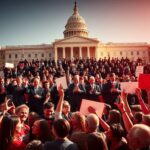F1 visa holders at Harvard University might have to leave the country because of President Trump’s recent announcement. The order targets foreign nationals who want to study at Harvard, affecting almost 7,000 international students who make up more than a quarter of the university’s student body.
What’s the current F1 visa status for these students? Undoubtedly, the proclamation instructs the Secretary of State to consider cancelling the current F1 student visas for current Harvard students. The ban, which affects 19 countries, could cut international student enrolment and stop about 10,000 F-1 visa applications each year. Still, a federal judge has temporarily suspended the proclamation, indicating that legal challenges against these new F1 visa rules are ongoing. Meanwhile, concerns about the financial impact remain significant, as international students contribute approximately $43 billion to the U.S. economy each year.
Trump Signs Executive Order Targeting Harvard F1 Visa Students

Image Source: The Press Democrat
President Donald Trump put his signature on an executive order without precedent on June 4, 2025, which impacts international students at Harvard University. This declaration stands as the first use of presidential immigration power against one specific educational institution, bringing about immediate doubt for thousands of F1 visa holders.
What the declaration states about F1 visa holders
The executive order puts a stop to entry into the United States for any foreign national who wants to study at Harvard University through the Student Exchange Visitor Program (SEVP). The ban has an impact on multiple visa categories, including:
- F visas (academic students)
- M visas (vocational students)
- J visas (exchange visitors)
What’s more, the declaration instructs Secretary of State Marco Rubio “to consider revoking existing F, M, or J visas for current Harvard students.” White House papers state that this move has authority under sections 212(f) and 215(a) of the Immigration and Nationality Act. These portions enable the president to ban any category of foreign individuals considered “detrimental to the interests of the United States.”.
The last decision offers a narrow exemption for students “whose entries are considered in the national interest.”. However, this exception still lacks defined boundaries for its application.
Which students this affects and when it starts
The executive order has an impact on new international students who plan to start their studies at Harvard. Furthermore, it creates doubt for current students who might go abroad and need to come back to the United States.
The suspension took effect immediately upon signing the order, with a duration of 6 months. However, the order’s wording implies the possibility of further extensions to this period. For students who have already been accepted for fall enrolment, this timeline poses significant issues, as “a six to ten month process” is the timeframe for obtaining a visa.
This Harvard visa rule coincides with a separate presidential order that restricts travel from 19 countries, imposing complete bans on 12 countries and imposing partial restrictions on seven others. The wider ban started on June 9, 2025.
As a result of the timing of the new visa rule, international students have limited options. Immigration attorney Reynolds said, “Changing plans for the next semester can be very tough, especially since it is already June.” The order affects those trying to enter the United States after it takes effect.
Harvard has already changed its lawsuit against the administration to include challenges to this recent executive action.
Harvard Fights Back With Legal Action Against Visa Ban
Soon after Trump’s announcement, Harvard responded with a legal challenge in federal court. The university updated its current lawsuit against the administration in preparation for a key legal fight over F1 visa rules.
Federal judge orders temporary halt
U.S. District Judge Allison D. Burroughs took swift action on June 5. She granted Harvard’s emergency request to issue a temporary restraining order (TRO) just four hours after the university filed it. The judge concluded Harvard would “suffer immediate and irreparable harm” without quick intervention. Furthermore, Burroughs extended her previous May 23 restraining order—which had stopped the Department of Homeland Security from cancelling Harvard’s certification to host international students—to at least June 20. This two-part legal shield protects both current and incoming international students for now as the case moves forward.
Harvard amends lawsuit to include new proclamation
In its 101-page amended complaint, Harvard called Trump’s proclamation “a clear attempt to get around the temporary restraint order this court has already issued.” The university claimed the administration had violated its First Amendment rights through a series of actions meant to get back at them. Harvard pointed out that the proclamation undermined its national security justification by allowing the same students to enter America if they attended other universities. This clash, Harvard said, “shows the Proclamation’s real aim: to punish Harvard as a disliked institution.”
How the court is interpreting the executive action
Despite early wins in court, the fight over F1 student visa status remains shaky. The court sees these rulings as short-term safeguards while the full case unfolds. Many legal pros point out that while Harvard might get quick help in lower courts, it could struggle if the case reaches the Supreme Court’s conservative justices. Before the June 16 hearing, Harvard needs to ask for a preliminary injunction to keep protections in place throughout the lawsuit. At the same time, even with the TRO, some Harvard students say they still face visa hurdles, with their applications stuck in endless “administrative processing,” which immigration experts believe might be a way to avoid a court review.
How the Ban Impacts International Students and U.S. Colleges

Image Source: Axios
Trump’s visa rules affect not only Harvard but also the entire college scene. The State Department’s decision to stop F1 visa interviews has caused a big mess for foreign students all over the country.
F1 visa news: Slower applications and unclear future
The State Department’s indefinite pause on new visa interviews has left students uncertain as officials put new social media checks into action. Currently, thousands of accepted students might not be able to start their fall semester when they should. Many schools have told international students not to travel abroad in summer, worried they might not be allowed back in. This situation is problematic because most students apply for visas to start school in the fall during May and June. Because of this, the State Department has already taken back “thousands” of visas.
Money and school problems for universities
The money impact on American schools is huge. Foreign students added $43.80 billion to the U.S. economy in the 2023-2024 school year and helped create over 378,000 jobs. Schools now rely more on foreign student fees as they get less money from states and the government. Money isn’t the only problem – research is in trouble too. Giovanni Peri, who teaches economics, said some European researchers have already chosen jobs in England instead of U.S. schools. Furthermore, researchers here now skip global meetings because they worry they might not be able to come back.
How students feel and what it’s like on campus
Campus talks are dominated by concerns about safety and uncertainty. A grad student from Shanghai wished she hadn’t applied to the University of Pennsylvania. She said, “Even if I study in the US, I might get sent back to China before I finish my degree.” Students from India report “a lot of worry and stress,” and many are rethinking their plans for US schools. One student lost his paid PhD spot at a school in Massachusetts because of Trump’s rules. This lack of certainty leads students to look at other countries, with German schools becoming very appealing to STEM students.
Why They Talk About National Security and What Critics Think
“I want to have foreign students.” — Donald J. Trump, President of the United States
National security worries are at the heart of the Trump administration’s reason to target Harvard’s F1 visa holders. But critics say these claims depend on doubtful data and political aims.
Trump’s logic: foreign sway and crime
The White House statement presents multiple reasons to restrict foreign students at Harvard University because of national security concerns. The government states that the FBI has consistently warned about foreign adversaries who exploit the simple access to American higher education institutions. The statement reveals Harvard University maintains “extensive entanglements with foreign adversaries” which receive “more than USD 150.00 million from China alone”. The statement reveals Harvard University has accepted members of the Chinese Communist Party paramilitary forces and conducted research that supports Chinese military development. The statement indicates that there has been a significant increase in criminal activity at Harvard, and it also notes that the university fails to discipline misconduct occurring on campus.
Criticism of overstay data and national security claims
Critics point out that the administration’s visa policies depend on contested Department of Homeland Security visa overstay reports. Analysts note that these reports count as “overstays” for people whom DHS “has been unable to confirm leaving the United States.” Former immigration officials highlight “too much guesswork built into the DHS assumptions” regarding overstays. DHS overstay reports show what critics call “false precision,” despite huge uncertainties in what they measure. In fact, a 42% drop in the suspected overstay rate for student and exchange visitors happened over a 15-month period ending in January 2024.
Expert opinions on legality and policy effectiveness
Legal experts raise doubts about the proclamation’s legality. They point out that it targets a single institution instead of a group of foreigners. Critics note that the same students “can enter the United States—just so long as they go somewhere other than Harvard.” This approach fails to show how Harvard students harm national interests. Higher education organisations emphasise that they have worked with the federal government to address national security concerns. Simon Marginson, a professor at Oxford University, believes the administration “seems to revel in destabilising education”.
Conclusion
The Uncertain Future for Harvard’s International Students
The Trump administration’s targeting of Harvard’s foreign students through a new rule marks a first in U.S. immigration policy. Thousands of F1 visa holders now face an unclear future in their studies even as Harvard took legal action. Although Judge Burroughs has temporarily suspended the rule, the long-term status of these students remains uncertain.
This White House move fits into a bigger trend of tighter visa rules affecting international education across the U.S. The economic fallout will spread far beyond Harvard, given that foreign students add about $44 billion to the American economy each year. Schools nationwide are closely monitoring this case, aware that it could potentially set dangerous precedents for their level of control over their own affairs.
Critics have challenged the administration’s national security reasons, pointing out inconsistencies within the proclamation itself. The specific targeting of Harvard students—while permitting the same individuals to study elsewhere in America—weaken claims about real security concerns. Furthermore, experts doubt the accuracy of the visa overstay data used to justify these limits.
Harvard’s updated lawsuit stands for more than just protecting its international student body; it’s a defence of academic freedom. If this case reaches the Supreme Court, its result could change the relationship between presidential immigration power and educational institutions. For now, thousands of students wait, their academic futures uncertain, stuck between clashing legal views and political forces they can’t control.
FAQs
Q1. How many international students are studying in the United States?
Records from the Department of Homeland Security show that about 1.5 million international students lived in the United States on F-1 or M-1 visas in 2023.
Q2. What is the economic impact of international students on the U.S. economy?
International students have a big effect on the U.S. economy. They added an estimated $43.80 billion during the 2023-2024 school year. They also help keep over 378,000 jobs in the country.
Q3. How has the recent executive order affected F1 visa holders at Harvard University?
The executive order has caused confusion for almost 7,000 international students at Harvard, who might face deportation. However, a federal judge has temporarily halted the proclamation, indicating that legal battles are ongoing.
Q4. What are the main reasons cited by the administration to implement these visa restrictions?
The administration points to national security worries such as possible foreign sway and claimed jumps in crime. They also say that some universities, Harvard included, have “deep ties with foreign enemies.”
Q5. How are universities responding to these new visa restrictions?
Harvard and other universities have taken legal action to challenge the visa restrictions. Many schools are telling their international students not to travel abroad during summer break. They worry about how these rules might affect their academics and finances.









































































































